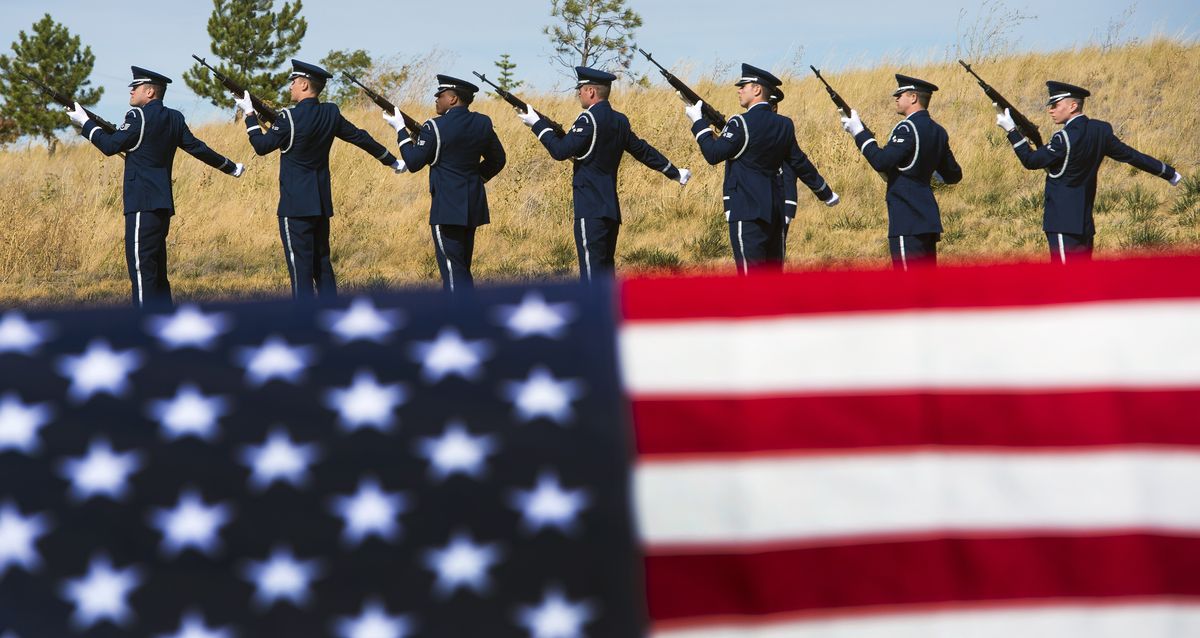Missing in America nonprofit lays 46 ‘lost’ local veterans to rest

Their cremated remains have been in storage at mortuaries and churches throughout the state, some for more than 40 years.
On a blustery Tuesday morning, in handcrafted boxes of purpleheart wood from Central America, 46 veterans and one military spouse were laid to rest at the Washington State Veterans Cemetery in Medical Lake. Some of those, placed in the row of niches, served overseas in World War I.
“There’s a million stories,” said Rudy Lopez, the cemetery’s director and Air Force veteran.
Tuesday’s ceremony is part of a nationwide effort, called Missing in America, to identify the remains of veterans who may be without families or other loved ones to ensure they receive a full military burial ceremony. Since 2007, when the nonprofit group launched, the remains of more than 2,500 veterans have been interred nationwide, the Missing in America project reports.
Five flags, honoring the five branches of the U.S. military, were unfurled as an honor guard fired 21 shots in salute, followed by “Taps” on a bugle. A stiff westerly breeze, which had been blowing all morning as tankers from nearby Fairchild Air Force Base soared overhead, slowed considerably for a harp and flute rendition of “Amazing Grace.” Volunteers from the Veterans of Foreign Wars, the Patriot Guard, the American Legion and other organizations carried the remains to the wall of niches as each name was read, depositing the wooden urns and pausing to salute or doff their hat.
“Finally, we’re bringing them home,” said Gary Condra, deputy director of the Washington Department of Veterans Affairs, in remarks prior to the interment.
Looking on from the audience was Mike Ross, a woodworker from Nine Mile Falls who watched one of the first ceremonies honoring these “lost” veterans on a TV news program years ago.
What he saw on the TV didn’t sit well, he said. The remains of veterans were being placed in the niches wrapped in plastic bags or inside cardboard boxes. Ross felt they deserved more than that.
“I didn’t think that was right, so I made up an urn (and) brought it down there. I asked if they would take it as a donation,” Ross said. “A couple days later, they gave me a phone call and said they were happy to. I’ve been doing it ever since.”
Ross is now in his fourth year crafting the urns.
It took him two months to finish the 47 urns that were used in Tuesday’s ceremony. They are constructed of purpleheart wood, or peltogyne wood, found naturally in Central and South America. The wood gets its name from its plum-like color, though its connection to the medal awarded to wounded service members made it perfect for the project in Ross’ estimation.
Ross didn’t serve in the military, as his number wasn’t called in the draft leading up to the Vietnam War. He was invited to carry some of the remains to their final resting place Tuesday, but he declined.
“I didn’t feel right about that,” he said. “The people that are doing it are actually service people, and I don’t want to intrude on that.”
Those laid to rest Tuesday included four veterans from World War I, and many from World War II, and the Korean and Vietnam wars.
Charles Booth, Jr., a sergeant in the U.S. Army during he Great War, was born in 1896 and died in 1968. It took 47 years for his remains to arrive at the cemetery in Medical Lake. Otto DeVinney, a fellow WWI veteran, trained at the Naval Station Great Lakes north of Chicago before attaining the rank of second yeoman in the U.S. Navy. He, too, was interred Tuesday in Medical Lake.
Though he plans to fully retire soon, Ross said he’ll continue to provide the urns for other veterans whose remains are still unclaimed.
“I’ll do this as long as I’m able, and as long as they want me to, as long as they keep retrieving remains,” he said.